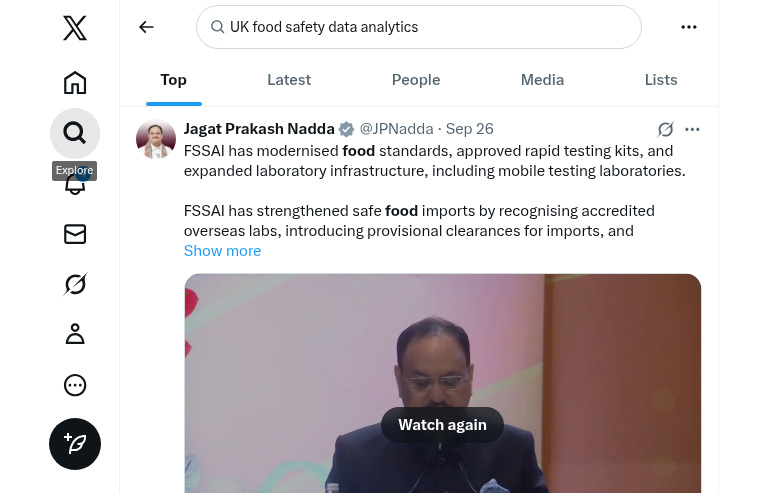UK Food Hygiene Inspection Crisis: 95,000 Business Backlog Threatens Public Safety
The Scale of the Crisis

The UK food safety system faces an unprecedented crisis as of September 2025, with ramifications extending across public health, business operations, and regulatory effectiveness:
[cite author="Food Standards Agency" source="Official Statement, June 2025"]As of June 2025, an estimated 95,000 food businesses are overdue for hygiene inspections, including 841 classified as 'high risk'[/cite]
This backlog represents approximately 16% of the UK's 600,000 registered food businesses - a staggering proportion that poses significant public health risks. Environmental health teams across the country are under increasing pressure:
[cite author="FSA Report" source="Local Authority Performance Update, September 2025"]Environmental health teams across the country are under increasing pressure, with staff shortages, rising workloads, tighter budgets, and growing public health demands continuing to stretch resources and capacity[/cite]
The crisis depth becomes clear when examining resource allocation. Through freedom of information requests, research revealed:
[cite author="The Grocer Investigation" source="Industry Analysis, 2025"]Since 2009, local food hygiene staff numbers had fallen by 27%, while council spending on food safety dropped 22%, with falls in enforcement activity directly corresponding to the ongoing decline in council budget and staff[/cite]
AI-Powered Solutions: FSA's Technological Response
The Food Standards Agency has developed a sophisticated AI system to help manage this crisis, representing one of the most advanced applications of machine learning in UK public health:
[cite author="FSA Technical Documentation" source="Algorithmic Transparency Records, September 2025"]The algorithm being used is the Light Gradient Boosting Machine (LightGBM), a framework for Machine Learning based on decision tree algorithms used for ranking and classification. The model classifies businesses based on identified features as being compliant or not and further predicts a food hygiene rating (0-5)[/cite]
The system's capabilities extend beyond simple risk scoring:
[cite author="FSA Board Meeting" source="September 17, 2025"]The tool supports local authorities to prioritise which businesses to inspect by predicting which might be at a higher risk of non-compliance with food hygiene regulations[/cite]
Importantly, the FSA has implemented responsible AI principles:
[cite author="FSA Responsible AI Framework" source="September 2025"]FSA has created a Responsible AI (RAI) framework based on five principles: Fairness, Sustainability, Privacy, Accountability and Transparency. The tool takes a 'human-in-the-loop' approach - there is a human check of the rating predicted by the tool before any decisions are made[/cite]
Revolutionary Software Solutions: Grape INSPECT Launch
In September 2025, Grape Software announced a game-changing solution for UK local authorities:
[cite author="Grape Software Press Release" source="September 2025"]Grape INSPECT replaces outdated paper-based practices and digitizes the entire inspection process, allowing decisions on food hygiene ratings to be made and published within days rather than weeks[/cite]
The software's technical capabilities address critical pain points:
[cite author="Grape Software Technical Specifications" source="September 2025"]Users of the software can record and upload notes and photographs during inspections directly onsite. The system then generates the inspection report with food hygiene rating, with all information being stored securely and easily accessible[/cite]
Offline functionality ensures inspections continue regardless of connectivity:
[cite author="Grape Software" source="Product Documentation, September 2025"]Grape INSPECT offers offline functionality, meaning EHOs can conduct inspections and input data offline, with the system syncing automatically once internet connectivity is restored[/cite]
Dark Kitchen Dilemma: The Hidden Food Safety Challenge
The rise of dark kitchens adds complexity to the inspection crisis:
[cite author="Academic Research" source="NIHR Open Research, 2025"]In the UK, dark kitchens currently represent approximately 15% of all food retailers across the three major online food delivery platforms in England (Just Eat, Deliveroo, Uber Eats), contributing significantly to the digital food environment[/cite]
Consumer awareness remains alarmingly low:
[cite author="Consumer Study" source="UK Food Environment Research, 2025"]Only 24.7% of respondents had heard of dark kitchens, and only 9.1% had knowingly purchased from a dark kitchen restaurant. Participants were dubious about hygiene standards and legality of such establishments[/cite]
Delivery platforms maintain varying standards:
[cite author="Platform Policy Analysis" source="Food Safety News, 2025"]Food delivery firms Deliveroo and Uber Eats are allowing businesses with 2 food hygiene ratings to be listed on their platforms. For Just Eat, non-standard restaurants need a minimum rating of 3[/cite]
Investment and Innovation Landscape
Despite the crisis, UK food safety technology attracts significant investment:
[cite author="Investment Report" source="AgFunder News, 2025"]The best-funded category in 2024 was Midstream Technologies, which includes food safety and traceability tech, logistics and transport solutions, and processing technology[/cite]
Notable UK startups are emerging with innovative solutions:
[cite author="StartUs Insights" source="Food Tech Analysis, September 2025"]HygieneCheck offers a mobile application to streamline food safety compliance for restaurants and pubs, facilitating self-audits focusing on critical areas such as hygienic construction, waste handling, and pest control[/cite]
Future Implications and Strategic Importance
The September 2025 FSA board meeting emphasized the strategic nature of this challenge:
[cite author="FSA Board Meeting Minutes" source="September 17, 2025"]The Board discussed their latest assessment of the performance of local authorities, who ensure food hygiene and food standards are being upheld across nearly 600,000 food businesses[/cite]
The convergence of AI, digitization, and regulatory innovation offers hope, but implementation speed remains critical with 95,000 businesses awaiting inspection and public health at stake.